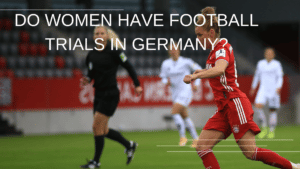
Women football trials in Germany , Despite how absurd it may sound now, women’s football was formerly illegal in Germany. Since the DFB lifted the ban on October 31, 1970, Germany has become more well-known in women’s football. I’m going to look back now.
Since then, Germany’s female soccer players have had unparalleled success in Europe, taking home 8 of the last 12 European championship trophies. With two World Cup titles, they are second only to the United States in terms of international triumphs. Such evident football success was difficult to reconcile with how tiny and under-attended the Hall of Fame ceremony was.
In reality, the issues facing the women’s national team initially resemble those facing the men’s squad. Germany lacks players of the highest caliber, with the exception of Dzenifer Marozsán, but although the men’s program seems to just require minor adjustments, the women’s program has more serious structural problems.
Germany, a previous superpower, won the World Cup in 2003 and 2007. The ladies were ousted by eventual champions Japan in the quarterfinals when Germany served as the tournament’s host country eight years ago. Four years later, in Canada, Germany was eliminated in the semifinals by eventual champions United States.
Women’s trails In addition to being a very lucrative sport where players may make more money weekly or monthly, football is currently incredibly popular in Germany due to the enormous success and performance of the international team. To boost chances and interest in women’s football teams, the German government established many sports development initiatives around the nation.
The popularity of women’s football in Germany has increased recently, although it still lags behind that of men’s. Many of the athletes, including Germany’s Ursula Holl in goal, are unofficial amateurs who also work a “day job.” Women’s amateur football in Italy is an excellent example. One of the most popular sports in the nation is football, however women are not allowed to play in the professional league. The majority of players in England compete for semi-professional teams like those in the FA Women’s Super League (WSL).
Women’s professional football is being led by the United States, which has a Women’s Professional Soccer league, and Brazil. With elite athletes like Abby Wambach and Kristine Lilly on the roster, the U.S. World Cup squad has been ranked first in the world since 2009.
Daniela Schaaf is a communication specialist at the German Sports University in Cologne. Her team has devoted years to studying the importance of women’s football in Germany and has come upon some disheartening information. Women’s football on television only has a huge audience appeal during major tournaments like the European or World Championships women’s league games. Less than 250 people typically attend regular season games, and the attendance in the stands isn’t much better.
What role does Male-Centric Media plays about women football trials
According to Schaaf, men make up 92% of the sports editorial employment in Germany. And a lot of sports reporting is governed by masculine standards of how to cover sporting events. Schaaf contends that it is crucial for women’s football and football trials that there be a greater representation of women in the sports media.
Numerous point to the artistic difference and the 51 power model in Germany that keeps sporting hearts and interests above profitable forces. But the return of women’s football trials and its growth is in the profitable interests of clubs and leagues long term.
Also, just because the English game has decayed to a point where profit rules and all football outside the Premier League – men’s and women’s – is pushed away, offered apparently for its own benefit but eventually to cover short- term gains, doesn’t mean we should accept it.
Wolfsburg, Bayern, Hoffenheim, Freiburg, Bayer Leverkusen, and 1.FC Köln are a some of the women’s football club names that are Bundesliga teams. Frankfurt will be the seventh place. Only RB Leipzig is considering significant investments and may have the most ambitious goals among the top German teams that have not yet made a Women’s Bundesliga commitment.
As a result, the investment is gradually increasing. A larger platform will be the next phase. The NWSL, for instance, receives the exposure it needs to expand in the United States via soccer websites like Pro Soccer USA. Outside of significant events, the women’s game in Germany does not receive enough attention. The Bundesliga must invest in the development of women’s soccer, but it also needs to receive the proper media coverage.
In Germany, women’s football is growing.
Columnist Sofia Bergmann examines the function of sports broadcasting in female football leagues and explores the effects of media coverage on sport and the persistence of gender inequality.
More media coverage of the Frauen (women’s) Bundesliga might foster a comparable culture among a younger generation of football fans, perhaps closing the gender difference in the long run. However, shifting the focus of the insane devotion inside men’s football is a difficult task.
The ongoing legal dispute between Megan Rapinoe and the United States Women’s National Team over their desire for equal compensation with the United States Soccer Federation has created significant waves, however the conflict does not just exist in the US. The DFB Pokal, Germany’s major football tournament, is presently in progress, thus women’s matches continue to receive less attention and awareness than men’s teams, but a shift in attitude is beginning.
Do you know Lena Oberdorf? If the answer is no, there is a significant probability that you will in the upcoming years since Germany has been making news about promises to improve the transmission of the Frauen Bundesliga. Oberdorf is the most expensive player in the league and represents one of Germany’s top teams, VfL Wolfsburg. The success of Wolfsburg has been chronicled over the years by IMAGO and its female photographers, including Annegret Hilse and Susanne Hübner.